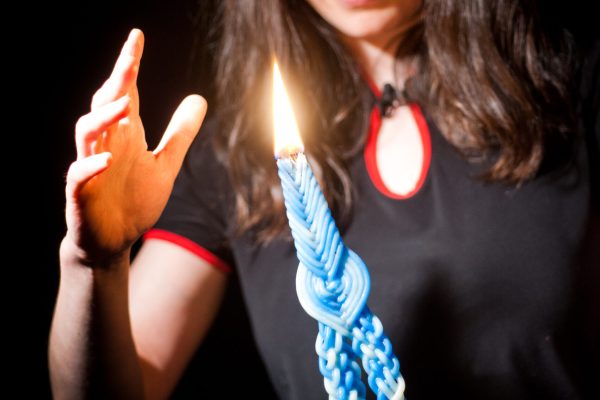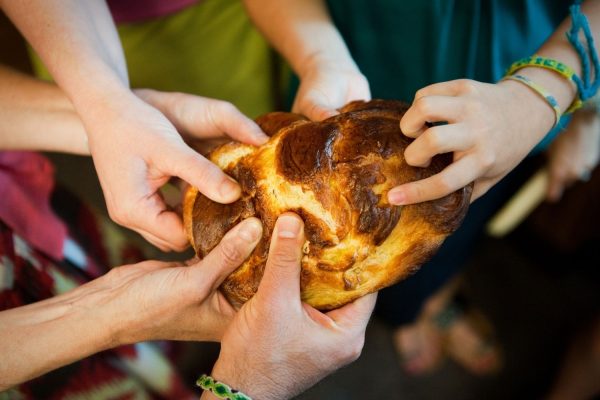Welcome to the blessingway. The term blessingway derives from the Navaho culture but the ritual is germane to people all over the world. The blessingway is a ritual that is done to honor a significant life change. Traditionally women have spent a great deal of their lives standing on thresholds and helping children and men across – by preparing children for rites of passage, orchestrating other lifecycle and holiday celebrations, and serving as the women behind mens’ transformations in status.
Kol ha-olam kulo gesher tzar m’od,
Gesher tzar m’od, gesher tzar m’od.
V’ha-ikar, v’ha-ikar –
Lo l’fached, lo l’fachad klal.
The entire world is a very narrow bridge,
a very narrow bridge. The most important thing
is not to be afraid at all.
בְּרוּכָה אַתְּ יָהּ אֱלֹהֵינוּ רוּחַ הָעוֹלָם עֹשָׂה מַעֲשֶׂה בְרֵאשִׁית
בָּרוּךְ אַתָּה אֲדֹנָי אֱלֹהֵינוּ מֶלֶךְ הָעוֹלָם עֹשֶׂה מַעֲשֶׂה בְרֵאשִׁית
B’rukhah At Ya Eloheynu ruakh ha-olam osah ma’asey v’reyshit.
Barukh Atah Adonay Eloheynu melekh ha-olam oseh ma’asey v’reyshit.
Praised are you, Adonai our G-d Ruler of the universe who does the work of creating.
בְּרוּכָה אַתְּ יָהּ אֱלֹהֵינוּ רוּחַ הָעוֹלָם שֶׁהֶחֱיָתְנוּ וְקִיְּמָתְנוּ וְהִגִּיעָתְנוּ לַזְּמָן הַזֶּה
בָּרוּךְ אַתָּה אֲדֹנָי אֱלֹהֵינוּ מֶלֶךְ הָעוֹלָם, שֶׁהֶחֱיָנוּ וְקִיְּמָנוּ וְהִגִּיעָנוּ לַזְּמָן הַזֶּה
B’rukhah At Ya Eloheynu ruakh ha-olam she-hekhiyatnu v’kiy’matnu v’higiatnu la-z’man ha-zeh.
Barukh Atah Adonay Eloheynu melekh ha-olam she-hekhiyanu v’kiy’manu v ‘higianu la-z’man ha-zeh
Praised are you, Adonai our G-d Ruler of the universe for giving us life, sustaining us, and enabling us to reach this time.
Judaism teaches us that the Exodus from Egypt through the parted Red Sea is one of the central moments in the drama of our past and it remains a central metaphor for Jewish redemption. The passage of people into new life of trials and triumphs through parted waters can be likened to a birth. The manna, which G-d provided for us in the wilderness, is like the mother’s milk we provide to our babies – a complete food, perfect in every way.
And the women dancing with their timbrels
Followed Miriam as she sang her song
Sing a song to the one whom we’ve exalted!
Miriam and the women danced and danced the whole night long
To view the full text of this song and to hear a recording of it, click on Miriam’s Song.
Many women in Biblical times are associated with childbirth. Sarah laughed when she discovered she was pregnant. Rachel cried in pain, “Give me children or I will die!” Hannah’s silent weeping prayer for children was so emotional that people who witnessed her outpouring of grief mistook it for public drunkenness. Shifrah and Puah were midwives in Egypt who saved countless Jewish lives and, thanks to Miriam, her mother, Yocheved, served as a wet nurse to Moses – her own son.
Pass around a string and beads. Ask everyone to share a wish, a prayer or a story as they add a bead onto the necklace. If they brought a gift for the mother to be this is the time to share it along with its meaning.
Sing Billy Joel’s “River of Dreams.”
When said as part of a traditional prayer service, this prayer – which comes from a prayer book that was written in Italy in 1786 – is inserted after the Amidah and before “May the One Who Makes Peace:”
I thank the Lord with all my
Heart that I have carried the full
Nine months and that up to now
God has spared me from all
afflictions that could harm a
pregnant woman and her child.
Surely God’s tenderness
is unending. Again I seek
God’s kindness so God will
be with me and support
me when my child is pressing
to be born, and so that God
will give me strength
to bring forth my child.
Wine is symbolic of joy in Judaism – we rejoice over the new life that is being created. Just as the parent gives birth to the child so too does the child give birth to the parent, teaching the parent new skills, opening the way to new experiences. The opening prayer of the Amidah reads, “Blessed are you Adonai. God of Abraham, God of Isaac, God of Jacob, God of Sarah, God of Rebekkah, God of Rachel, God of Leah,” as if to remind us constantly that each child has a unique relationship with his or her parent. We are different parents to each of our children. The Jewish people’s relationship with God is reborn with each generation. We, too, are reborn as parents with each child. If the Torah depicts parenting as a struggle and a joy for God, why should it not be for us?
בָּרוּךְ אַתָּה אֲדֹנָי אֱלֹהֵינוּ מֶלֶךְ הָעוֹלָם בּוֹרֵא פְּרִי הַגָפֶן
בְּרוּכָה אַתְּ יָהּ אֱלֹהֵינוּ רוּחַ הָעוֹלָם בּוֹרֵאת פְּרִי הַגָפֶן
Barukh Atah Adonay Eloheynu melekh ha-olam borey p’ri ha-gafen.
B’rukhah At Ya Eloheynu ruakh ha-olam boreyt p’ri ha-gafen.
Praised are you Adonai our G-d Ruler of the universe creator of the fruit of the vine
Just as we receive an extra soul on Shabbat and use the spices to revive ourselves when the soul leaves us – let us now revive ourselves from the emptiness that I will feel in my womb next month and the fullness in my arms, heart, and breasts. To hold a newborn in our arms is to hold the power of life. How can such a tiny thing be so vigorous? How can the mother’s body be ripped apart and yet be whole? How can life give forth life, changing from emptiness to fullness to emptiness? How can a process so carnal feel so divine?
בָּרוּךְ אַתָּה יְיָ אֱלֹהֵֽינוּ מֶֽלֶךְ הָעוֹלָם בּוֹרֵא מִינֵי בְשָׂמִים:
בְּרוּכָה אַתְּ יָהּ רוּחַ הָעוֹלָם בּוֹרֵאת מִינֵי בְשָׂמִים
Barukh Attah Adonay Eloheynu melekh ha-olam borey miney v’samim.
B’rukhah At Yah ruakh ha-olam boreyt miney v’samim.
Praised are you Adonai our God Ruler of the universe for all of the world’s spices.
God created the universe by separation – He separated the heavens from the earth, the light from the darkness, the day from the night, the sea from the land, the holy from the profane. So, too, birth is creation by separation.
בָּרוּךְ אַתָּה יְהוָה אֱלֹהֵינוּ מֶלֶךְ הָעוֹלָם בּוֹרֵא מְאוֹרֵי הָאֵשׁ
בְּרוּכָה אַתְּ יָהּ אֱלֹהֵינוּ רוּחַ הָעוֹלָם בּוֹרֵאת מְאוֹרֵי הָאֵשׁ
Barukh Atah Adonai Eloheynu melekh ha-olam borey m’orey ha-esh
B’rukhah At Yah ruakh ha-olam boreyt m’orey ha-esh.
Praised are you Adonai our God Ruler of the universe creator of the light of the fire
בָּרוּךְ אַתָּה אֲדֹנָי הַמַּבְדִּיל בֵּין קֹדֶשׁ לְחוֹל
בְּרוּכָה אַתְּ יָהּ רוּחַ הָעוֹלָם הַמַּבְדִּילָה בֵּין קֹדֶשׁ לְחוֹל
Barukh Atah Adonay Eloheynu melekh ha-olam ha-mavdil beyn kodesh l’khol.
B’rukhah At Yah ha-mavdilah beyn kodesh l’khol.
Praised are you Adonai our God Ruler of the universe who separates the sacred from the profane.











